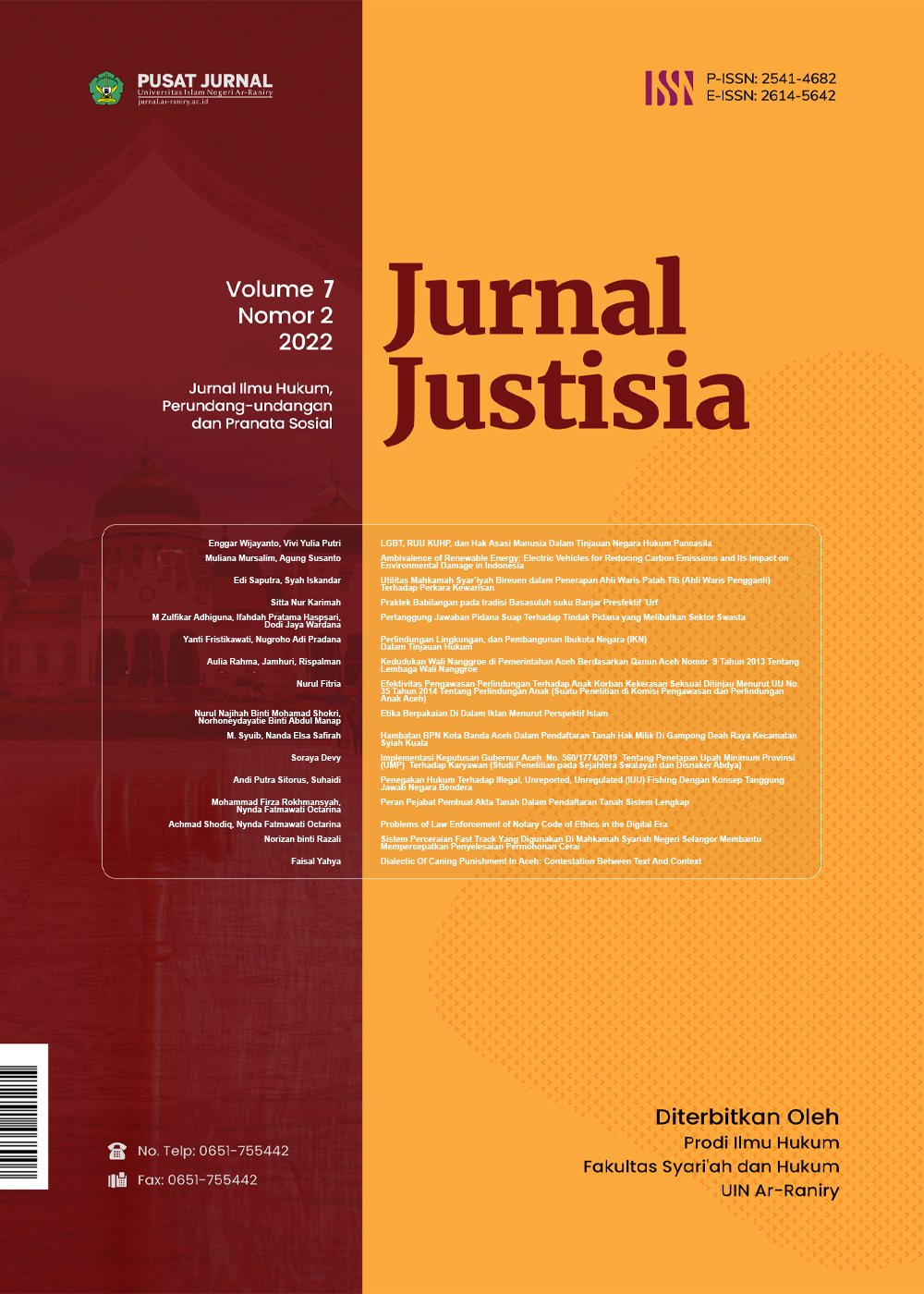Problems of Law Enforcement of Notary Code of Ethics in the Digital Era
DOI:
https://doi.org/10.22373/justisia.v7i2.15773Abstract
The purpose of this study is to analyze the problems faced by Notaries in implementing the code of ethics in the digital era and what are the problems of law enforcement of the notary code of ethics in the digital era. This research is normative juridical research using statutory, conceptual, and case approaches and analyzed descriptively qualitatively. The results of the analysis show that the digitalization era which is dominated by social media platforms can be an opportunity for Notaries to simplify their performance, but on the other hand it also opens up new potential for Notaries to take actions that violate the Notary's code of ethics. That is why the existence of the Notary Supervisory Council is very necessary to really carry out supervision and action against notaries who violate the code of ethics. The problem that has been experienced in the context of law enforcement of the notary code of ethics is that so far MPM seems to work half-heartedly, so that many Notaries do not heed the warnings or sanctions given when they are found to have violated the Notary Code of Ethics.
Keywords: Digital Era, Ethics Code, Law Enforcement Problems, Notary.
References
Adjie, Habib, “Konsep Notaris Mayantara Menghadapi Tantangan Persaingan Global”, Jurnal Hukum Respublica, Volume 16, Number 2 (2018): 201–18 <https://doi.org/10.31849/respublica.v16i2.1436>
Ahmadi, Fahmi M., & Jaenal Arifin. Metode Penelitian Hukum. Jakarta: Lembaga Penelitian UIN Syarif Hidayatullah Jakarta, 2010.
Anshori, Abdul Ghofur, Lembaga Kenotariatan Indonesia, Perspektif Hukum dan Etika. Yogyakarta: UII Press, 2009.
Fahri, Ramadhan., Sutiarnoto, Jelly Leviza., & Azwar, Keizerina Devi. “Analisis Yuridis terhadap Notaris yang Publikasi dan Promosi Diri Ditinjau dari Kode Etik di Kota Medan”, Paper Knowledge . Toward a Media History of Documents, (3 April 2015), 49–58.
Indrapraja, Irwan S. “Problematika Peran dan Fungsi Majelis Pengawas Daerah Notaris”, 19.2 (2018), 213–30.
Kamil, Ahmad. “Filsafat Kebebasan Hakim”, 2012.
Negara Republik Indonesia, Pancasila, dan Undang-Undang Dasar Negara Republik Indonesia Tahun 1945,
Prabawa, Bagus Gede Ardiartha. “Analisis Yuridis tentang Hak Ingkar Notaris dalam Hal Pemeriksaan menurut Undang-Undang Jabatan Notaris dan Kode Etik Notaris”, Acta Comitas, 2017, 98 <https://doi.org/10.24843/ac.2017.v02.i01.p09>
Prasetyawati, Betty Ivana, & Prananingtyas, Paramita. “Peran Kode Etik Notaris dalam Membangun Integritas Notaris di Era 4.0”, 15 (2022), 310–23.
Rahman, Sufirman., & Nurul Qamar. “Etika Profesi Hukum”. Pustaka Refleksi, Makassar, 2014.
Saputra, Riyan., & Djajaputra, Gunawan. “Penegakan Hukum terhadap Notaris yang Mempromosikan Diri Melalui Media Sosial”. Jurnal Hukum Adigama, Volume 1, Number 1 (2018), 1941 <https://doi.org/10.24912/adigama.v1i1.2312>
Sugianto, Qisthi Fauziyyah., & Handoko, Widhi. “Peluang dan Tantangan Calon Notaris dalam Menghadapi Perkembangan Disrupsi Era Digital”, Notarius, Volume 12, Number 2 (2020), 656–68.
Sulihandari, Hartanti., & Rifiani, Nisya, “Prinsip-Prinsip Dasar Profesi Notaris”, Jakarta: Dunia Cerdas, 2013.
Tardjono, Heriyono, “Urgensi Etika Profesi Hukum sebagai Upaya Penegakan Hukum yang Berkeadilan di Indonesia”, Jurnal Kepastian Hukum dan Keadilan, Volume 2, Number 2 (2021), 51 <https://doi.org/10.32502/khdk.v2i2.3462>
Undang-Undang Republik Indonesia Nomor 30 Tahun 2004 tentang Jabatan Notaris.
Downloads
Published
Issue
Section
License
The Authors submitting a manuscript do so on the understanding that if accepted for publication, copyright of the article shall be assigned to Jurnal Justisia : Jurnal Ilmu Hukum, Perundang-undangan dan Pranata Sosial, Ar-Raniry State Islamic University, Indonesia as the publisher of the journal.
Jurnal Justisia : Jurnal Ilmu Hukum, Perundang-undangan dan Pranata Sosial right of first publication with the work simultaneously licensed under Creative Commons Attribution-ShareAlike 4.0 International License (CC BY-SA 4.0) that allows others to share (copy and redistribute the material in any medium or format) and adapt (remix, transform, and build upon the material) the work for any purpose, even commercially with an acknowledgment of the work's authorship and initial publication in Jurnal Justisia : Jurnal Ilmu Hukum, Perundang-undangan dan Pranata Sosial. Authors are able to enter into separate, additional contractual arrangements for the non-exclusive distribution of the journal's published version of the work (e.g., post it to an institutional repository or publish it in a book), with an acknowledgment of its initial publication in Jurnal Justisia : Jurnal Ilmu Hukum, Perundang-undangan dan Pranata Sosial. Authors are permitted and encouraged to post their work online (e.g., in institutional repositories or on their website) prior to and during the submission process, as it can lead to productive exchanges, as well as earlier and greater citation of published work (See The Effect of Open Access).

